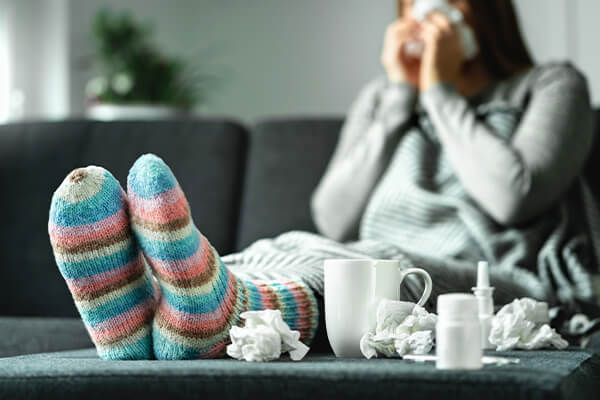Using Your CPAP in Winter with Colds and Flu

February 3rd 2023
Winter can be a challenging time for CPAP users. The lack of humidity in the dry cold winter air can cause the nasal passages to become dry.
If you do have a dry or runny nose with CPAP during the winter or the air through the mask feels too cold and your sleep is disrupted, there are some potential solutions to help overcome these problems including:
- Using a full-face mask
- Using heated humidification
- Using home remedies
Before we get to the potential solution right for you, let’s discuss a little more about the relationship of CPAP with colds and flu.
What’s the Effect of Flu and Colds with CPAP?
It’s never easy to sleep when you have a cold or flu, but for people on CPAP therapy during winter, it can be more difficult than usual to tolerate sleep apnoea treatment. Why does this happen?
Well, one of the main functions of the nose is to warm and moisten the air you breathe. Therefore, if the air is cold, tiny blood vessels inside the nostrils dilate to help warm up the air. This extra blood flow then causes the airway to narrow and leads to additional mucus production to protect its sensitive tissues and to add more moisture to the inhaled air. Unfortunately, this may cause nasal congestion and a runny nose.
This extra blood flow can therefore make using CPAP with a cold difficult, however, stopping treatment is not advised. This is because if you do stop CPAP while having a cold or flu, the tiredness you felt before using therapy will return.1
Now let’s move on to ways to help you using your CPAP when you have a cold or flu.
1 – Using a Full-Face Mask
Some CPAP masks are nasal masks that require you to breathe only through your nose, but when nasal congestion develops, it becomes difficult to do this. Nasal congestion or resistance as experienced during a cold can lead to you breathing through your mouth.
When air from your CPAP device escapes through your mouth (mouth leak) it can be a significant problem that will compromise the effectiveness of your CPAP therapy. If you do have mouth leak, it means your airways are not open as they should be from the treatment as some of the pressurised air is escaping, causing discomfort and dry mouth.
For these reasons, it can be a good option to switch to a full-face mask when you have a cold or flu. A full-face mask blows air through both the mouth and the nose. Use of this type of CPAP mask with a cold will ensure that if you do revert to breathing through your mouth, treatment can still be used and it will continue to be effective.
2 – Using Heated Humidification
Use of heated humidification with CPAP treatment is recognised as an effective method of helping to prevent or reverse the symptoms resulting from cold, dry air during winter. This is because the air is warmed and moistened before it reaches the nose, meaning it may help with nasal congestion and ease inflamed nasal passages. In essence, the humidifier is designed to make using CPAP with a cold or flu more comfortable. If you are using a ResMed device, your care provider may be able to supply you with a humidifier to fit your CPAP machine.
It’s important to note that some people using heated humidification can experience a problem known as ‘rainout’ during cold weather. This is when the warmed moistened air coming from the humidifier is cooled by room temperature air as it moves down the tube towards the mask, and moisture in the cooler air returns to a liquid. The result of this process can lead to droplets of water or condensation gathering in the tube and mask.
If you do utilise a humidifier while using CPAP with a cold or flu, the following tips may help:
- Always have the device and humidifier positioned lower than the bed.
- If you are getting a dry nose or mouth, try turning up the humidity. If you are getting any moisture in your mask or feel you are suffering from ‘rainout’, turn down the humidity.
- Insulate the hose by covering it with a tubing wrap. Custom made tubing wraps can be purchased from ResMed.
- If you continue to get a dry nose or mouth, or moisture in your mask, consider using ClimateLineAir heated air tubing together with the Climate Control function. Climate Control is a ResMed device feature that warms the air you breathe to a comfortable temperature and is designed to reduce the risk of water droplets forming in your air tubing. Note that Climate Control is only available when the heated humidifier and the ClimateLineAir are attached.
3 – Using Home Remedies
There are also a few simple home remedies that can be tried to make treatment more comfortable during the colder months of the year:
- Use of a saline nasal spray to add moisture to the sinus passages can relieve swelling and help you breathe easier.
- Decongestants may help, although these can take a while to work and should be used early enough so that they take effect by bedtime.
- An over the counter spray can be used to decrease inflammation in the nasal passages and help reduce the swelling of the nasal mucosa.
If you still feel too uncomfortable while using CPAP with a cold or flu, experience ear pressure, pain or have any other concerns, contact your GP or medical provider.